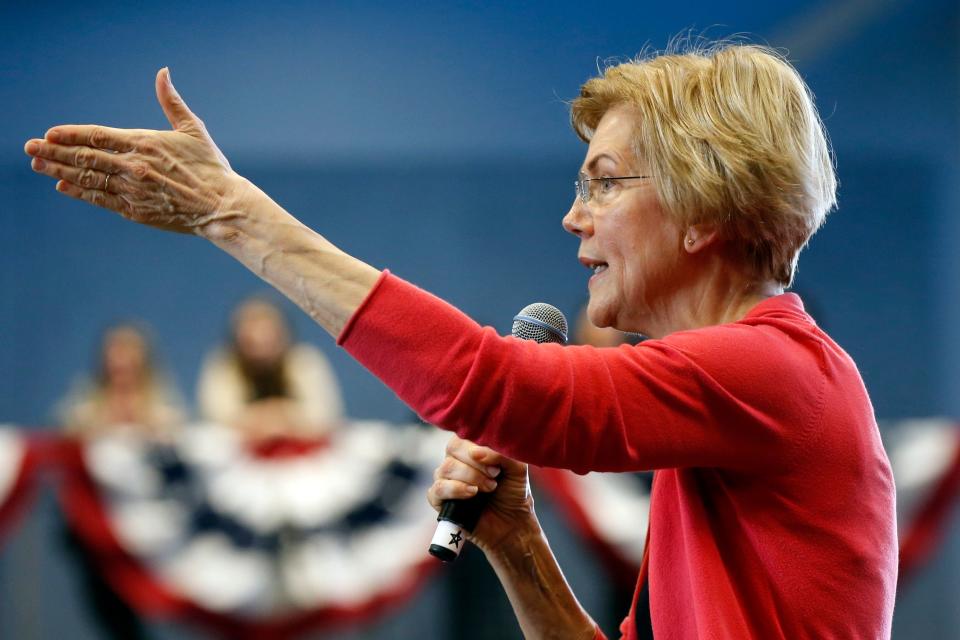Noooooooo ... we can't start the 2020 presidential race yet

What is arguably the single most pernicious custom in the American political process has just commenced with nary a whisper of complaint, criticism or learned lament. This cyclical civic pestilence has reemerged right on schedule, like a crop of hideous cicadas, but no one seems to have noticed.
When Sen. Elizabeth Warren announced her candidacy on the final day of 2018, she kicked off the ignoble tradition of the two-year presidential campaign — marathons of marketing and Machiavellianism that distort governance, cost fortunes and fertilize cynicism. Kirsten Gillibrand and Julian Castro weren't far behind.
This year’s launch went unlamented because pundits, pols and voters now assume that this is simply the way it is and must always be. Presidential campaigns last 22 months. That’s it.

What we think is normal strikes the rest of the democratic world as lunacy.
America has by far the longest campaigns in the world — and the most expensive. It isn’t close.
In most parliamentary systems, campaigns for the head of state job last between four and six weeks. In 2015, Canada had its longest campaign in modern history – 78 days. The election in the United Kingdom that year lasted 38 days.
Read more commentary:
Voting problems are predictable and avoidable. Here's how to fix them before 2020.
Dear 2020 candidates, cybersecurity chief is your most important hire. Don't screw it up.
Americans want 'someone entirely new' from Democratic Party for 2020. Let's deliver that.
Mexican law limits what we would consider the primary and general campaigns to 150 days combined. French campaigns cannot officially begin until two weeks before the first ballot. Japan limits its campaigns to 12 days.
The College of Cardinals elected Pope Francis to represent the world’s 1.2 billion Catholics in only two days.
Okay, admittedly that’s not a perfect comparison. The point is that every democracy in the world has seen the wisdom of limiting the duration of political campaigns — except ours.
We used to be wiser.
Extended primary seasons and multi-year campaigns are a recent development in the U.S., an anomaly in our own history. Remember, the Constitution has absolutely nothing to say about political parties. And primary elections were unheard of in the nation’s first 100 years.
Endless campaigns weren't always the norm
Popular primaries (or caucuses) did not became the universal form of candidate selection until after the elections of 1968. The endless presidential campaign was pioneered by Jimmy Carter who declared for the 1976 race on Dec. 12, 1974, almost two years before election day. Now we view the permanent campaign as a permanent part of political landscape. It isn’t and it should not be.
One unintended and controversial consequence of the semi-permanent campaigns is that they are necessarily more expensive than short ones. The cost of all 2016 elections was estimated to be $6.5 billion. Some argue this is money well spent, that it is a form of political speech that educates and informs the electorate. Others say sums that massive corrupt the whole system.
What is beyond argument is that there is now an entire economy of political consultants, fundraisers, lobbyists, interest groups, media companies and marketers that is deeply vested in making campaigns longer and more expensive.
This has disastrous effects that would be called HR problems in the private sector. First, elected and aspiring officials waste an extraordinary amount of productive time raising money. It dominates their schedules and calculations. Secondly, being in permanent campaign mode — steered by pollsters and alleged strategists — reinforces the worst behaviors of political animals: obsession with reelection, pandering to funders, tribal partisanship and a profound fear of being the butt of negative ads.
Worse, the endless and undignified process discourages many able and gifted people from ever considering politics as a vocation.
Congress should act to reform campaign laws
In presidential cycles, campaigning makes governing even more difficult and sclerotic. Incumbents are timid and paranoid. The media increasingly ignores policy to focus on the horserace.
And year after year, voter turnout in America ranks at the bottom of the world list. Long campaigns turn voters off.
Once upon a time, some argued that long campaigns were a good way to road test candidates, ensuring the nominees would be steady and ready. After the election of 2016, no one is making that argument.
One path to change would be for the two dominant parties to work with state legislatures to at least shorten the primary season. Politicians can’t be stopped from campaigning all they want, obviously. But imagine a world where there were no primaries before the 4th of July. Pleasant, right? Unlikely, for sure.
Maybe less so these days. Congress could act.
The class of Democrats elected to the House in 2018, much like the Class of 1974 elected after Watergate, is interested in political reform. The first bill introduced in the session was HR 1, the “For The People Act.” It aims to reign in campaign money, enhance voting rights protections and make redistricting less partisan.
Both parties would do their weary constituents a big, bipartisan favor by adding laws to shrink campaigns to their to-do lists. It might be the easiest and most effective single reform available.
Dick Meyer is the author of “Why We Hate Us: American Discontent in the New Millennium.” Follow him on Twitter: @DickMeyer_DC
You can read diverse opinions from our Board of Contributors and other writers on the Opinion front page, on Twitter @usatodayopinion and in our daily Opinion newsletter. To respond to a column, submit a comment to letters@usatoday.com.
This article originally appeared on USA TODAY: Noooooooo ... we can't start the 2020 presidential race yet

